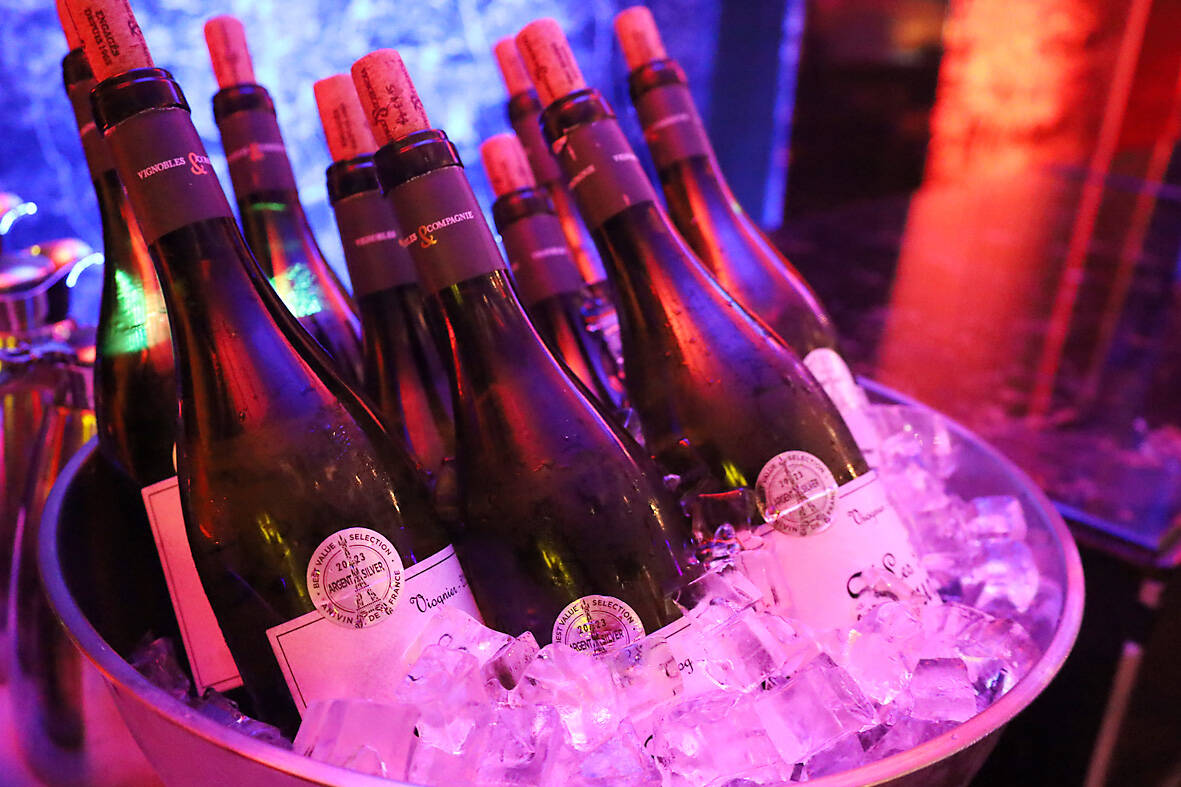On Friday last week, around 450 guests converged on the third floor ballroom of Grand Hyatt Taipei in Xinyi District (信義) to sample the very best in Franco-hospitality.
The annual gala dinner, hosted by the French Chamber Taiwan (法國工商會) came at the end of an inauspicious month that has witnessed some wild weather, heated political protests and heightened cross-strait tensions. Business leaders and industry folk were doubtlessly looking for an occasion to cool off. Thankfully, event-organizers didn’t disappoint.
ELEGANCE IN MOTION

Photo: Thomas Bird, Taipei Times
This year’s theme was Elegance in Motion, which, according to the organizers, reflected Paris’ role as host city of this summer’s Olympic games. Stuffed mascots, the Olympic Phryge — based on the traditional small Phrygian hats — were laid out on the red carpet to greet guests.
After obligatory photo ops, food and drink soon took center stage — Royal Caviar was nibbled; French wines, Perrier-Jouet Champagne and specially crafted cocktails by Pernod Ricard were sipped, as business cards exchanged hands like chips on a poker table.
As one would expect of any French affair, fashionwear was also under the spotlight. Attendees were invited to wear “red, white and blue” — the tricolor of the French flag — “with a touch of gold” for “elegance” while the lofty models in attendance were sporting neoteric garments courtesy of award-winning designer Gioia Pan (潘怡良),the Queen of Knitwear, and Taiwan Jewelry Designers’ Association Chairman Lu Zheng-nan (呂政男).

Photo: Thomas Bird, Taipei Times
A speech by Director of the Bureau Francais de Taipei (BFT) Franck Paris welcomed guests to the gala just as the first course was served at front-of-stage VIP roundtables, where a number of political and industry figures were seated.
Yet notwithstanding the gala’s haute couture and specialites culinaires the evening proved to be uplifting and, indeed, light-hearted — carefully choreographed so as not to force feed guests with too heavy a dose of “brand France.”
“That’s how it’s been since we first produced this event five years ago,” Mathias Daccord of event company One Milometer (一毫米) says of the gala’s philosophy. “We work with Stephane Peden to keep it fun, he’s aware that corporate events can get boring.”
Peden has been the General Manager of the French Chamber for six years and sees his role as multifaceted, “something like a community manager, bringing people together to create something meaningful for our members and for society in general.”
One of the evening highlights was a tongue-in-cheek performance courtesy of Peden himself, who paid tribute to the breakdancing competition that will be premiered at the Olympic Games Paris 2024. Dressed in classic hip-hop attire, including a Chinese Taipei sports jacket, Peden made his way to stage to the accompaniment of a French rap song, before dropping the mic and showing off his breakdancing skills. He then threatened to battle anyone in the audience, only to be confronted by Taiwanese taekwondo blackbelt Lo Chia-ling (羅嘉翎). The 22-year-old Olympic-hopeful promptly exhibited her high-kick just a few inches from Peden’s nose.
FRANCO-TAIWANESE COOPERATION
The jovial character of the gala dinner was underscored by more serious intentions vis-a-vis French business in Taiwan.
Talking backstage with the Taipei Times, Peden said, “Of course, France is country of luxury brands, joie de vie and food and beverage, but we are also a country of innovation and industry.”
He noted that many French enterprises were keen to work with their Taiwanese counterparts on everything from decarbonization to AI and that the French Chamber Taipei had established an event called Rendezvous “to organize panel discussions between ministers and French companies.”
When asked whether French entrepreneurs were ever reluctant to do business in Taiwan due to geopolitical concerns, Peden — who has been resident in Taiwan for 13 years and is a shareholder in popular nightspot Opera Taipei — believes the media is to blame for fanning the flames.
“The problem [for] Taiwan is it is not known as well as it should be, as, for a long time it was forgotten when everybody was focusing on [doing business in] China. Now, after COVID, people understand that Taiwan is a democracy and a place where you can find a lot of high-end electronics like semiconductors. But the media in Europe gives a wrong image about what’s happening here by reporting on what China does, which sows fear. When you live in Taiwan you really see it differently from how you see it on the TV in France.”
Peden’s upbeat sentiment is seemingly channeled by the high-energy showband ADOGA (阿逗仔) who take to the stage after the lucky draw to close the evening with an eclectic set of pop and rock classics. Digestifs are served at the bar, and the crowd hits the dancefloor.

In the March 9 edition of the Taipei Times a piece by Ninon Godefroy ran with the headine “The quiet, gentle rhythm of Taiwan.” It started with the line “Taiwan is a small, humble place. There is no Eiffel Tower, no pyramids — no singular attraction that draws the world’s attention.” I laughed out loud at that. This was out of no disrespect for the author or the piece, which made some interesting analogies and good points about how both Din Tai Fung’s and Taiwan Semiconductor Manufacturing Co’s (TSMC, 台積電) meticulous attention to detail and quality are not quite up to

April 21 to April 27 Hsieh Er’s (謝娥) political fortunes were rising fast after she got out of jail and joined the Chinese Nationalist Party (KMT) in December 1945. Not only did she hold key positions in various committees, she was elected the only woman on the Taipei City Council and headed to Nanjing in 1946 as the sole Taiwanese female representative to the National Constituent Assembly. With the support of first lady Soong May-ling (宋美齡), she started the Taipei Women’s Association and Taiwan Provincial Women’s Association, where she

Chinese Nationalist Party (KMT) Chairman Eric Chu (朱立倫) hatched a bold plan to charge forward and seize the initiative when he held a protest in front of the Taipei City Prosecutors’ Office. Though risky, because illegal, its success would help tackle at least six problems facing both himself and the KMT. What he did not see coming was Taipei Mayor Chiang Wan-an (將萬安) tripping him up out of the gate. In spite of Chu being the most consequential and successful KMT chairman since the early 2010s — arguably saving the party from financial ruin and restoring its electoral viability —

It is one of the more remarkable facts of Taiwan history that it was never occupied or claimed by any of the numerous kingdoms of southern China — Han or otherwise — that lay just across the water from it. None of their brilliant ministers ever discovered that Taiwan was a “core interest” of the state whose annexation was “inevitable.” As Paul Kua notes in an excellent monograph laying out how the Portuguese gave Taiwan the name “Formosa,” the first Europeans to express an interest in occupying Taiwan were the Spanish. Tonio Andrade in his seminal work, How Taiwan Became Chinese,